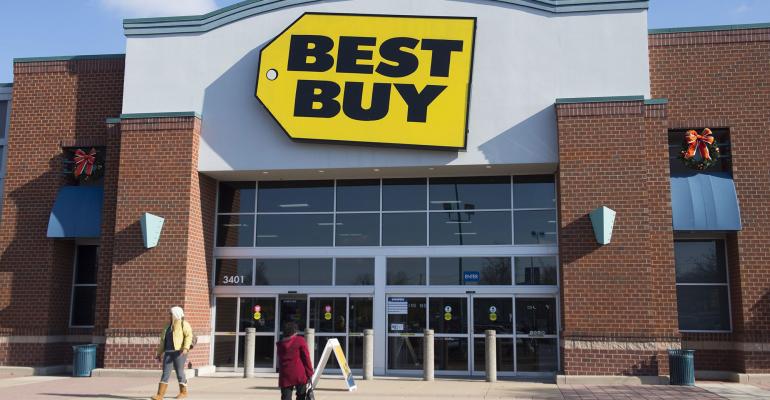(Bloomberg) --Best Buy Co. is well-known for bringing computers and other gadgets back to life. Now, it wants to take care of its shoppers’ health as well.
The retailer’s strategy to beef up its fledgling health-care business will be a key focus of its investor meeting Wednesday in New York. The plan includes selling everything from fancy fitness machines to health-monitoring services for seniors. It could help Best Buy grab some of the $3.5 trillion market for health spending in the U.S. -- while offsetting sluggishness in its main business of selling laptops, TVs and phones.
“Health care is overly complex, has not evolved all that much over time, and remains a frequent pain point for customers. All of these factors make health care ripe for disruption,” said Simeon Gutman, an analyst at Morgan Stanley, who sees health-related products and services adding $11 billion to $46 billion to Best Buy’s long-term revenue. “It should be no surprise, then, that many nontraditional players including Best Buy are entering the industry.”
The health-care push is an opportunity for new Chief Executive Officer Corie Barry to put her own stamp on the company and step out from the sizable shadow cast by her predecessor Hubert Joly, who brought Best Buy back from the brink seven years ago. Barry is betting that Best Buy can thrive as digital-health technology migrates from hospitals to homes, but she’ll have to move fast since the retailer is just one of many companies looking to capitalize.
“I am not saying we will own the whole health-care experience -- we don’t want to,” Barry said in an interview. “But we are uniquely well-suited to be in people’s homes with technology. We can help with the tech side of health.”
Best Buy shares rose 1.5% to $68.41 at 9:42 a.m. in New York. The stock had gained 27% this year through Monday’s close, outpacing the increase of the S&P 500 Index.
Competition
Best Buy’s move into this space comes as Walmart Inc. has also stepped up its health-care ambitions, introducing low-cost medical clinics that offer primary-care services and also mental-health counseling. Another rival, Amazon.com Inc., paid $753 million for mail-order startup PillPack to get into the pharmacy business.
At Your Service
Best Buy’s focus, meanwhile, is less on flu shots and more on the technology that underpins health-care services. There it faces challenges from tech giants including Google, Microsoft Corp. and Samsung Electronics Co., which are typically Best Buy’s partners.
The retailer has even hired a chief medical officer to spearhead it efforts, according to an internal memo obtained by Bloomberg. Daniel Grossman, a physician and veteran of medical-product maker Medtronic Plc who also practices at the Mayo Clinic, will join the company Oct. 1 and report to Asheesh Saksena, the president of Best Buy Health.
In the past year or so, Best Buy has spent upwards of $1 billion on acquisitions in the health space, most notably the $800 million purchase of GreatCall Inc., which sells mobile phones and emergency-response systems for older Americans. At the time, Joly called the senior market “white space waiting to be captured.” The number of Americans ages 65 and older is projected to nearly double to 95 million by 2060 from 52 million in 2018.
Best Buy followed up this year with two more tuck-in deals, buying senior-focused health-services company Critical Signal Technologies as well as a small engineering group in Watertown, Massachusetts, that designs wearable sensor systems that can help seniors live longer in their homes by predicting when they’ve fallen and need medical assistance.
“It’s all about Grandma,” Michael Pachter, an analyst with Wedbush Securities Inc., said in an interview. Because the company already is known as a seller of technology to consumers who need help figuring it all out, “it makes sense for Best Buy to offer this.”
The service part of the equation dovetails with Best Buy’s broader desire to expand its services revenue and lessen its dependence on products like video-game consoles, where demand can fluctuate and much-hyped gadgets can flop. The company now offers an annual service plan that promises to fix any product you own, no matter where it was purchased.
Services made up 6% of Best Buy’s U.S. revenue in its most recent quarter, up from 5% at the end of its last fiscal year. But it’s still a small slice of the overall business.
Simplicity, Trust
“People are spending less money on stuff,” Brian Owens, an analyst at Kantar Consulting, said. “Retailers need to invest in alternative revenue streams that provide services and experiences. As you evolve into health care, the big opportunity is simplicity. And people trust Best Buy.”
Products will also play into the strategy: Best Buy will put internet-connected fitness devices from brands like NordicTrack and ProForm into just under 100 stores in time for the holiday shopping season. Like other retailers, it also sells fitness trackers and products like the Owlet Smart Sock, which wraps around infants’ feet and tracks their sleep patterns and heart rates.
Not everything has worked so far, however. A Best Buy pilot program called Assured Living, which aimed to outfit seniors’ homes with a complex network of smart-home gadgets and sensors that caregivers could monitor, was deemed too difficult to sell in retail stores and has been reconfigured. Best Buy will also need to find more partners, like health-insurance companies, that can help promote the retailer’s offerings to their existing customers.
Investors will look for more details at the presentation, particularly a sense of how big this business can be -- and how much it can help offset any slowdown in electronics sales.
“We think the market doubts the durability of its core business,” Morgan Stanley’s Gutman said. “A next big thing is necessary.”
To contact the reporter on this story: Matthew Boyle in New York at [email protected].
To contact the editors responsible for this story: Crayton Harrison at [email protected]
Jonathan Roeder, Lisa Wolfson
© 2019 Bloomberg L.P.

